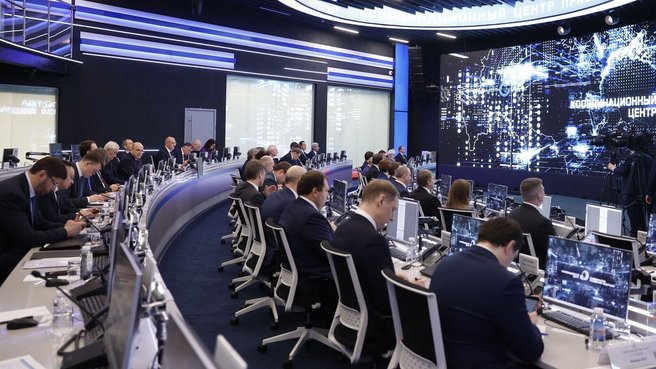Mikhail Mishustin’s opening remarks:
Good afternoon, colleagues,
Today we will continue to evaluate the preliminary results of the decisions made to achieve the national development goals set by the President. Let us discuss the implementation of strategic initiatives that are overseen by my deputies Andrei Belousov, Dmitry Chernyshenko and Marat Khusnullin.
Of course, significant changes and long-term positive trends are not possible without major changes in digital transformation and the widespread introduction of advanced information technologies. These advancements make it possible to significantly improve the practice of interaction between people, businesses and government bodies, as well as increase efficiency and reduce costs, both in terms of time and money. It is equally important to make all necessary services clearer and more accessible to the people.
We must not only use the existing solutions but also actively work on developing our own scientific and intellectual foundation. This is the challenge we must address today in order to move forward.
Five strategic initiatives are focused on the digital transformation of the state. These include the Internet Access project, which is aimed at upgrading the entire telecommunications infrastructure, especially in the regions with limited communication capabilities and especially in schools and educational institutions.
Additionally, there is a project aimed at accelerating services and creating favourable conditions for entrepreneurs when accessing state, municipal, and other services. There are also several other initiatives that will increase quality, convenience, reduce time and costs, and increase the number of relevant specialists in the market.
Significant progress has been made in this area. Let me cite several examples. For example, 93 percent of communities with population over 2,000 people have been provided with access to fourth generation networks (LTE). About 115 million records are registered on the government services website. Three quarters of all notifications are sent by government agencies online. We have become used to this, although this was not the case just recently.
Last year, over 100,000 schoolchildren completed courses in modern programming languages. Over 86,000 young people have obtained additional IT qualifications through courses offered by digital departments. In addition, 30 advanced engineering schools have been created in partnership with high-tech companies, and another 20 have been selected.
Considering the changes in the geopolitical situation, the President has determined six top priorities for Russia’s development. We have spoken about them more than once. They include strengthening technological sovereignty and taking the lead in the main areas. The Data Economy national project was developed as a response to the new challenges. It is a comprehensive project that crisscrosses fields and unites the interests of most diverse elements of the economic and social spheres. Technologies and solutions developed in this framework will be used universally throughout the country.
The initiatives in the construction industry that the Government is implementing now are no less important for the regions. One of them is entitled “Cities of Great Opportunity and Revival of Small Residential Communities.” Its goal is to create conditions for intensive economic development in both metro and rural areas. Based on the past year’s results, the Government approved nine long-term plans. The quality of roads was improved, the scale of housing construction expanded and services were made available online under another 18 plans. It is impossible to do without all this.
We are significantly ahead of schedule here – almost by double. All this will allow us to look for resources for implementing large-scale investment projects in the regions.
Under the initiative on the National Spatial Data System, the time limit for cadastral and property rights registration has been reduced to three days. The share of e-services here has approached 60 percent.
A record amount of housing, including individual houses, was built last year. Today, we will discuss how the implementation of the My Private House initiative helped in this regard and what we should do to keep up the dynamics.
The Government is also carrying out the Infrastructure Menu initiative. It includes a set of measures allowing companies to receive financing on easy terms for the construction of social and transport facilities and utility networks. The financing totals 2.3 trillion roubles. The biggest demand here is for infrastructure budget loans. Up to 2025, 1 trillion roubles is provided for approved projects. This will make it possible to put into operation almost a thousand facilities. Special treasury bonds worth 190 billion roubles were issued last year for the same purposes.
Infrastructure bonds are yet another mechanism. So far they have raised 200 billion roubles, and 46 projects in 24 regions have already been approved. I’d like to recall that quite recently we were just toying with this idea, but the President’s support has turned it into yet another functioning mechanism.
The use of the National Wealth Fund made it possible to complete the modernisation of 720 housing and utility facilities. Now people will have modern networks as well as reliable water and heat supply.
We are upgrading our public transport under the Mobile City initiative. About 2,000 units were sent to the regions last year. Intensive development of commuter connections is underway.
We are optimising the length of the investment-and-construction cycle, including for the building of large industrial facilities, which is very important. The amount of documents, information, materials and approvals required for launching new projects has been substantially reduced. By the end of this year, over 30 procedures that were previously in paper form, will be made available in electronic format.
Colleagues,
The curators of these strategic initiatives will tell us about their implementation in more detail. We must work to hit all our targets. This is necessary for preserving the dynamics of national development and addressing the many challenges that our country and the global economy are facing today.













